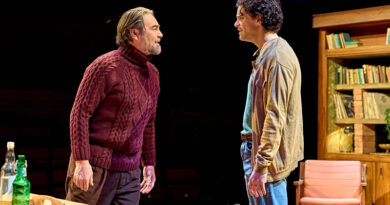“Dear Octopus” at National Theatre (Lyttelton)
Jane Edwardes on the South Bank
19 February 2024
It is difficult to approach the National Theatre’s revival of Dodie Smith’s 1938 play Dear Octopus without a certain amount of baggage. The play, once a huge success, was one of those swept aside by the arrival of the so-called angry young men in the late fifties. Fashions change, and the popularity of Osborne and his like has also dwindled, but well-made plays, set among the upper middle classes, still struggle to win recognition. So, is Smith’s play ripe for resuscitation, or does Dodie continue to be a dodo?

Lindsay Duncan and Malcolm Sinclair.
Photo credit: Marc Brenner.
The play is a gentle examination of the nature of family in which not very much happens. Four generations of Randolphs gather to celebrate Dora and Charles’s golden wedding anniversary in their large, if somewhat decaying, house in Essex. It is up to their son, Nicholas (Billy Howle), to make a toast: “To the family – that dear octopus from whose tentacles we never quite escape nor, in our inmost hearts, ever quite wish to.” Smith explores the idea of families. Even when they appear stable, there always has to be change with the passing of time. The young grow middle-aged, and the old die, living on in the memories of those who remain, until they too pass on. Life’s opportunities slip by.
The Randolph family is large, sustained by servants who appear to have devoted their lives to them. Lindsay Duncan’s Dora has given birth to six children, two of whom have died: Peter in the First World War; and Nora in Singapore of an undisclosed cause. With 17 characters – where did small theatres find the means to revive it so often? – coming and going from one room to another, it is not always easy to work out how they are all related. Of the three surviving daughters, Cynthia is a woman of mystery, Hilda suffers from obsessive tics, and Margery is the stay-at-home mum with two precocious children. There’s also Scrap, the poignant daughter of Nora, whose father seems to have pretty much abandoned her.
Emily Burns’s handsome, sensitive production does the National proud. Duncan gives a particularly fine performance as Dora, a graceful matriarch with a sharp streak, who is determined that the weekend should go well, and is always able to find jobs for others to do. Not surprising then that the nursery becomes a place of refuge. Shades of Chekhov here, as there are in the relationship between Nicholas, the only remaining son, and Dora’s companion, Fenny (excellent Bessie Carter), who adores the oblivious Nicholas.

The ensemble.
Photo credit: Marc Brenner.
Frankie Bradshaw’s design is all faded greens and blues as the set impressively revolves between the dining room, the nursery, and the hall where, oddly, they all gather after dinner. The women look elegant in Bradshaw’s gorgeous costumes, demure during the daytime and ravishing for the party. It is a shock when Dora recalls once wearing a bustle, a reminder that she was born in the 19th century. Her sister-in-law, Belle, sharply played by Kate Fahy, exudes American glamour as the red-haired widow who has had more work done on her face than is good for her, and who still holds a candle for Malcolm Sinclair’s kindly, unambitious Charles. Oliver Fenwick’s lighting reflects the fact that the house is lit by gas lamps and heated by coal fires. He poignantly highlights the portrait of Peter in uniform that hangs at the bottom of the stairs.
The play was first performed in 1938, and Burns has introduced a couple of news broadcasts to remind us that the Second World War is just around the corner. It’s an understandable decision but not a wise one, simply highlighting the fact that while the rapid passing of time is the focus of so many discussions, there is never any reference to even the possibility of war.
You can see why the National would want to revive this – and, with a cast of 14, have the resources to do so. A once feted mid-20th-century play, unusually written by a woman with a number of major female roles. Given that Smith continues to have a reputation as a novelist, in particular for the post-war I Captured a Castle (not to mention The Hundred and One Dalmations!), this was certainly worth exploring. And what a novelty to see a play with a sentimental, happy ending! But for all the delicacy of the writing, the majority of the characters are too thin, and the gentility too stifling to make a strong case for this being a masterpiece unfairly overlooked.









